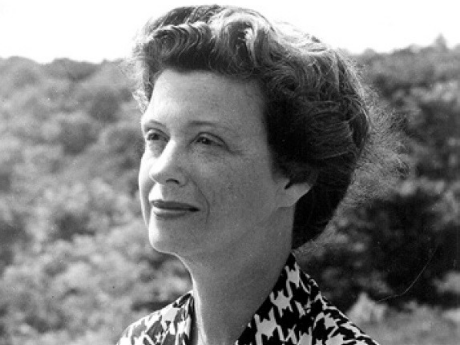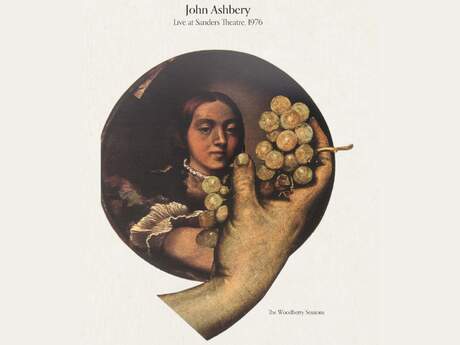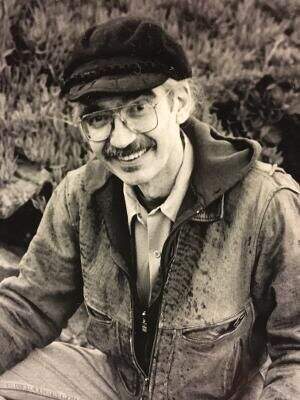Tributes
Elizabeth Spires on Josephine Jacobsen

The lovely lady posted in red
No Hunting. Last night
the supreme hunter crossed the meadow,
into the house, to the target.
—"Obit," Josephine Jacobsen
Josephine Jacobsen's entrance into the world on August 19th, 1908, was premature and dramatic, greatly surprising her American parents who were vacationing in Canada and anticipating her arrival several months later. Weighing only two-and-a-half pounds, she was not expected to survive, but her formidable and devoted mother, Octavia Winder Boylan, was determined that she would. In a memoir, Josephine imagined the indignity of being put in an incubator and fed, like a baby bird, with an eye dropper. A year ago, at 94, recalling the circumstances of her birth, she said to me wonderingly, "I must have been a fierce particle."
Like her father, a doctor and amateur Egyptologist who died when she was five, she had a gift for happiness, and it spilled over to anyone fortunate enough to be in her orbit. She described herself as "a short-term pessimist but a long-range optimist," and humorously wrote in "Distinctions": "It is hard to love the pessimist/ holding forth from his dank ditch/ searching for woes as for Easter eggs/ like Proust's butler.// It is hard to love the optimist/ putting his jolly mask on grief,/ predicting joys which never come/ but will be said to have done so."
Despite her father's death, her childhood was happy enough, but peripatetic, with Josephine, her mother, and her beloved nurse Alice travelling constantly, never staying in one place long enough for Josephine to go to school. Taught by the occasional private tutor, she became, early on, a voracious reader. She also began writing poetry and saw her first poem published in the children's magazine St. Nicholas when she was ten. It was not until she was 14 and had, as she said later, "missed geography entirely," that she was enrolled at Roland Park Country School, a private girls' school in Baltimore, where she graduated in 1926. When the headmistress indicated that Josephine was college material, the idea was brushed off by her mother who believed that only girls who had 'no prospects' would go to college. Instead, the beautiful Josephine Boylan wrote, travelled, and acted with the Vagabond Players (a well-known Baltimore theatre troupe) until, in 1932, she married Eric Jacobsen, a tea importer, and, fittingly and poetically, was changed into a double dactyl. Part of the same generation that included Lowell, Bishop, Berryman, and Ammons (the last a close friend who dedicated his book, Tape for the Turn of the Year to her), Josephine quietly, and with little fanfare, published her first four books—Let Each Man Remember (1940), For the Unlost (1946), The Human Climate (1952), and The Animal Inside (1966)—with small presses outside the literary circles of New York. For her, it was the writing itself, not prizes or possible honors, that mattered the most. A busy wife and mother (she had a son, Erlend), she did much of her writing—poems, short stories, and critical essays— 'on the side,' in brief intense spurts at Yaddo and MacDowell, and during two-month stays each winter on Grenada. It was only in 1971, at the age of 63, when she was appointed Consultant in Poetry to the Library of Congress, that she became better known.
Much of her best work was still to be done, and the soaring excellence of the poetry she wrote in her sixties, seventies, and eighties easily rivaled or surpassed what many of her contemporaries had achieved earlier in their careers. (Her friend William Meredith told her she was "postcocious.") Coming into her own when confessionalism was in its heyday, she took a more oblique approach. In a short biographical piece written for Contemporary Authors, she explained, "If there is little trace in this account of early days of the things which are darker, of pain and loss, it is never because these things were nonexistent, but because they are in the very texture of writing, where they belong."
The words applied to her poetry as well, each book (The Shade-Seller, The Chinese Insomniacs, The Sisters, In the Crevice of Time) stronger and more resonant than the last. But it was only in the last fifteen years of her life that she received many long overdue honors: the Lenore Marshall Prize, the Shelley Memorial Award, the fellowship of the Academy of American Poets, the Poets' Prize, the Robert Frost Medal, and election to the American Academy of Arts and Letters.
It was my good fortune to become friends with her in the middle years of my life and the last twenty of hers. The friendship was relaxed, candid, and penetrating, no subject off-limits, despite the two generations that separated us. I helped her compile her occasional prose into her last book, The Instant of Knowing (Michigan, 1997), poring over faded xeroxes of essays, book reviews, interviews, and discovering several dozen short prose pieces on place, language, popular culture, and manners, all gems, that had appeared in the late 1970s in the unlikeliest of places, the op-ed page of the Baltimore Sun. One of my favorites, titled "Openness, a Vast Confusion," examined our culture's penchant for being on an immediate first-name basis. What she said then seemed especially apropos to the slowly deepening way in which I came to know her. In it, she described the stages of a friendship whereby "...acquaintanceship becomes congeniality, congeniality becomes intimacy. Everyone has experienced a lightning flash of intimacy—with a child, with a stranger. But it is not accidental or casual; it is the flowering of long preparation....Every child who has tried to pry loose the gripped petals of a bud to see at once the loose, unfolded secret of the full bloom knows how hopeless is the forced instant blossom. That loosening has been prepared by earth and roots and weather, rain and sun, heat and chill."
When her husband Eric died suddenly in December 1995 (they had been married for 63 years), I saw her at her most shaken and devastated. Was it the measure of our friendship that, an old sweater pulled around her, she did not try to put on a brave face but let the tears flow freely? Later, more composed, she recalled how one of the ancients (which one? if only I could remember...) had advised his companions never to restrain their grief. In a very long life, after losing a father, mother, brother, stillborn daughter, grandson, and, finally, husband, she could write, with sibylline wisdom, that our tears "are a classless possession yet are not found in the museum of even our greatest city."
A year or two after Eric's death, and after several falls, Josephine moved from their apartment at Broadmead, a retirement community outside Baltimore, to a large sunny room in the main building, close to support staff and nurses. She brought as much of her life as would fit into her reduced quarters. Two bookshelves of books precious to her. An old chest where, over drinks late one afternoon, we discovered a small trove of unpublished poems. And paintings, photographs of family and friends, and poetry broadsides that gave the room the feeling of an intimate, welcoming gallery.
High in one corner of the room was a large curling willow that her son Erlend had brought back from a walk one day. Its spidery branches corkscrewed wildly out in all directions, a gaunt, bare bouquet that she never tired of looking at. Full of energy yet intensely fragile, it remained intact and undamaged in that increasingly crowded room that saw, over the years, a steady stream of friends come to visit. I marvelled at its indestructibility and wonder where it is now.
The Japanese have a word for the spirit that inhabited that willow. Wabi. Wabi is a way to approach life. It is the beauty found in extreme simplicity, a contentedness in bareness and doing without. Wabi beauty possesses depth, and an object imbued with wabi is believed to contain an old soul. As more and more was taken away—the loss of those dear to her, the loss of her privacy and independence, the diminishment of her eyesight—Josephine was like that willow branch, inhabiting the final years of her life with more and more depth, the calm, perfected radiance and shine of an old soul.
She wrote that "...a childhood, an adolescence, tends to dictate whether [a writer's] mode shall be mining or voyaging—both offering endless opportunities." She was, in her poetry, both miner and voyager. There will never be another like her.
—Originally published in Crossroads, Spring 2004.


